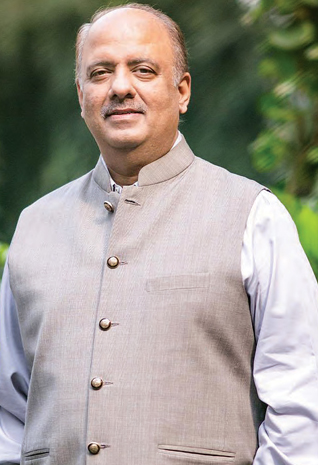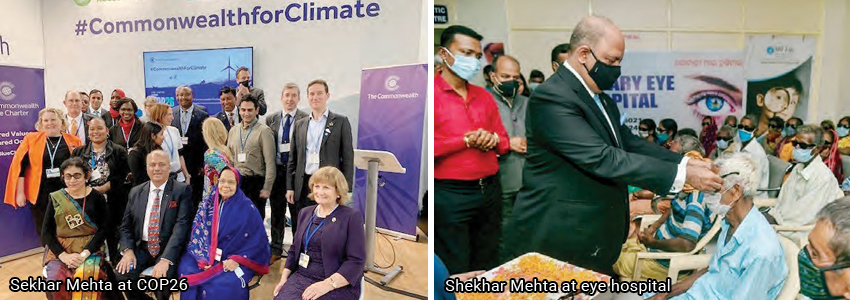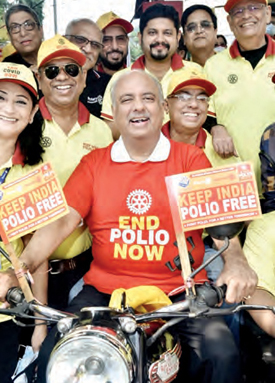Enact Change - Create Social Impact

A Rotarian since 1984, Shekhar Mehta, President (2021-2022), Rotary International, is committed to social causes around the world. Be it building nearly 500 homes for families distraughted by the Indian Ocean tsunami in 2004, or spearheading a programme dedicated to performing free heart surgeries, or creating a ripple effect in education, the humanitarian has left no stone unturned to lead the world on the path of equality, progress and justice. He reflects on his journey and the landmarks he has achieved as the President of Rotary International in this interview.
"In social and humunitarian service, there is no conclusion. The entire world is fighting hunger, poverty, illiteracy, lack of clean water, sanitation and there is no conclusion to it. Milestones, yes. The biggest challenge that I have taken up is total literacy in India."
Corporate Citizen: You became a member of Rotary International in the year 1984. What inspired you in the first place to join this prestigious organisation committed to creating social impact?
 Shekhar Mehta, President (2021-2022),
Shekhar Mehta, President (2021-2022),Rotary International
Shekhar Mehta: Strangely enough, it wasn’t much of an inspiration. A friend of mine asked me to join Rotary and I did. I did have knowledge about these organisations because both my parents were involved with the Lions Club International. I could see some of their service activities once in a while but I wasn’t deeply involved with service. It was only after I joined Rotary did it change my perspective towards life itself for a period of time. My club took up two projects and I was witness to the change that it brought into the lives of people. It was amazing, to say the least. We create a fuss about so many things and people live a different life altogether, braving the odds every day.
CC: What are some episodes that left a deep impact on you while working with Rotary International?
I remember I had gone in a car to reach a village, which was about 50 km from my home. There was no road, I had to sit on a motorcycle and go inside. We make a fuss about how high the ceiling in our home is, while the villagers cannot even stand erect in their huts. We crib about the air conditioners at home, while their homes are windowless. It concerns us whether our water bottle is filtered, but they drink water from the same pond, where they and their buffalos take a bath. We constantly berate ourselves over which school or college my kids go to, but for those keen to learn in the village, the shade of the tree becomes their campus.
It dawned upon me while working on these projects that there is an existence of two worlds. One was my comfortable world and another is a stark contrast to this world of mine.
I was just 25 years old when I joined and service was the last thing on my mind. I joined Rotary to make friends but when you see the other world, it starts changing your perspective towards life itself. I have spent 15 years of my life dedicated to the social good of people. It has become the prime objective of my life.
CC: Tell us about the most challenging initiative that you took up as a member, which you have taken to a successful conclusion?
You know, in service, there is no conclusion. The entire world is fighting hunger, poverty, illiteracy, lack of clean water, sanitation and there is no conclusion to it. Milestones, yes.
So, the biggest challenge that I have taken up is total literacy in India. This is a work in progress. I would say we have not even reached a significant stage there. That’s because anything significant in India has to be so big. It’s such a large country with massive population that for anything to make headways, it takes time.
A few years ago, we took up a challenge to make India totally literate and the challenge is now more crystallized, but it’s a gargantuan challenge nevertheless.
At Rotary, as part of the literacy challenge, we design something known as the TEACH India Programme, which is an acronym for Teacher’s Support and E-learning, Child Development and Happy Schools and I’ll give you an example of the length and breadth of the programme itself.
During the pandemic, the Prime Minister stated that a direct telecast would be done for children studying at home. I wrote to the PMO about this, and in just two months’, the Government of India gave them the entire curriculum from Grade 1 to Grade 10 based on the NCERT’s curriculum. That’s audio visual content based on e-Vidya channels. A large number of children would watch these as well as the Diksha Portal created by the Government of India, which is probably the largest educational forum portal in the world. The amount of content we at Rotary have given the Government of India is mind-boggling and millions and millions of children are benefitting out of it.
The next programme we are working towards and have discussed with the Prime Minister is that of making India totally literate. That’s focused towards ensuring that every adult in India becomes literate. India has the highest population of adult illiterates which is more than 20 crores and we have set our sights on walking them on the path of literacy in the next five years. The Rotary has set a goal to achieve this task in partnerships and along with the Government. We already have a scheme at hand and the concept is very easy - Each One, Teach One. We have just as many students in the education system as we have adult illiterates. In fact, we have 25 crore students in the education system and we have 20 crores of adult illiterates. Ideally it should take a year to happen, but we are giving it five to six years. We are on the right path with respect to our Rotary India Literacy Mission, which is highly goal-oriented as far as adult literacy is concerned.
To add, we are taking out e-learning programme beyond the borders of India, to the neighbouring countries and in Africa, which is a significant step.
"Rotary’s leadership is the best man management institution around. Thousands of people work for you without even getting paid a single penny and they are at the forefront, tackling world’s biggest problems in their own way."

CC: Speaking of African countries, you are doing pathbreaking work in these nations too...
One of my principle jobs is to go around the world and inspire Rotarians to grow more and do more. We have two goals, one is internal and the other is external. The internal goal is to grow more and this year has been phenomenal in terms of growth. The external goal entails being a source of inspiration.
I have visited about 20 African countries and in 20 of them, I met the Heads of 18 of them. And to each of them, it was not a courtesy visit but the the idea behind each visit was what is it that rotary can offer. What is it that we can do along with them, and among some of the things that I suggested is free heart surgeries for children. That’s something I will be involved with deeply for a long time. It’s been more than a decade that I have been involved with this initiative. The numbers are telling and I shared with the President of Uganda and the Parliament of the country that in a first, more than 30 children have already come to India for surgeries. The surgeries are already being performed upon them.
I met the President of Nigeria and told him to set up an eye hospital. We are partnering with them here. Similarly, there are various other programmes and projects in different countries, at various stages.
In African countries, I also offered them to do projects on mangroves. I discussed this with the Commonwealth Secretary General too. I committed that we will work in seven different countries on mangroves, but realised soon enough that more countries needed them so the numbers has gone beyond 10 now. I am happy to tell you that since the last four months that I have made this commitment, we have already done the groundwork for the funding and hopefully it should get started in the next few months.
Coming back to the free heart surgeries, more than a thousand children’s heart surgeries will be done in India.
CC: The pandemic affected a lot of sectors in India as well as beyond it. Did it stall any of the initiatives taken up by Rotary International? How did it obstruct them and how did you steer them in a direction of progress once again?
That’s an important question. Necessity is the mother of invention. Zoom existed for many years but we realised its potential only during the pandemic. Now life is unthinkable without zoom. When one door shuts, many others open up. I will give you an example of e-learning, our initial plan was to reach out to every school in India and to have audio-visual learning. It is something that children in villages will now learn about the solar eclipse in the audio visual medium, where they can see how the moon rotates, how the earth rotates, what’s the axis and why the eclipse takes place.
Initially, the plan was to visit every school, but then the pandemic happened and the children were not going to school any longer. So, the audio-visual was telecast. The software that enables this learning has been introduced to more than 50,000 schools in India.
To shares examples, we came to know that the government was giving 50,000 television sets to children in Punjab and Sikkim. We added the entire content to those televisions. LG and Samsung are our partners in this regard and our content is getting directly fed into these televisions.
CC: You are also picking up cudgels for women empowerment. Please take us thorugh some of your initiatives in this direction.
I believe firmly that girls are half the humanity and they should have half the opportunity. But that’s not how it is around the world. I was surprised when I discussed this concept with the fellow members of my Board. I was surprised that every part of the world had some issues as far as women’s issues were concerned. There is discrimination and disadvantages for girls across the world. It exists in some varying form or another.
We undertook some research on areas that needed attention. The seven areas of focus are inclusive of illiteracy, WASH, (water, sanitation and hygiene), maternal and childcare, disease prevention, environment, peace, and economic community development.
Let’s look at menstrual hygiene. When it comes to literacy, how about ensuring that there is gender segregation and toilets in every school, so that the girl child does not drop out by the time she is in Class 8 or 9. All of these projects are showing good success. It was unbelievable that in a year’s time, we are in nearly 40000 clubs and in more than 20 countries and nearly 1.25 million members of countries to spread to the ground level. A majority of clubs have taken up this programme and this is applaudable.
visited African nations and thereby began red programmes, wherein they have started setting up an enterprise of making sanitary pads, distributing, marketing and creating awareness to use reusable pads. Over 12.3 billion sanitary pads go into the waste systems in India annually, just imagine. If that gets changed, what a big thing will it be and it will be a landmark in terms of hygiene too.
The next important initiative is teaching girls self-defense techniques. I think this should be mandatory in schools. The boys will also start understanding these technique. In India, we have given more than 5000 bicycles to girls, so that they can move to their schools easily and safely. Solar lanterns have been provided. Hand washing stations have been created for the girls separately. Sanitary pads vending machines have been put up in the different schools with incinerators. The idea is one girl empowered is a family empowered.
We are also working diligently on skill development. An example is the distribution of thousands of sewing machines. There are also programmes for those who aspire to become a beautician. This is a job that is high in demand and beauticians earn about 20 to 25,000 to even 30,000 Rupees easily.
"Each time I take up any responsibility at Rotary, it widens my horizon of work. As the President of the Club, I was looking after a city. At national level, I look after the country. As Director of the Board, I got to take up South Asia, but as its President, I could oversee the entire world, impacting greater change."
CC: Since you mentioned this in one of your previous answers and India has a significant ratio of girls who drop out of school, what are you doing to ensure that girls continue to study at schools?
We have a programme about sending children back to school. I met Smriti Irani ji and she asked me if I could do something to send dropped-out girl children to schools. The next moment we knew, we were committed to this cause and training dropped-out girls to send them to school again. This included speaking to their parents about child marriages, early marriages, teenage pregnancies and trafficking. In fact, there is a group of Rotarians all around the world who have formed a group we call Rotary Action Group, dedicated to preventing and stopping child trafficking.
My own club is involved in building 87,000 toilets in rural areas for the past seven years. Just creating the toilet is not good enough but telling them to use the toilet is also important.
CC: When you took the mantle of Presidency for Rotary International, what were your aspirations? Did you have any moments of anxiety, any reservations as all eyes were on you, given that this was a big leap from being a member to taking on a leadership role?
 Shekhar Mehta participating in a
Shekhar Mehta participating in aend Polio campaign
No challenge as such, except for the time that the pandemic happened. But, fortunately I was ready to take that risk and go out safely because I realised it was my job. Each time I take up any responsibility at Rotary, it widens my horizon of work. As the President of the Club, I was looking after a city. At national level, I look after the country. As Director of the Board, I got to take up South Asia, but as its President, I could oversee the entire world, impacting greater change. As of today, we will be working with 25 countries to work on social initiatives and bring about change. I am sure that the next President will take on more countries and enhance the work we are already doing.
CC: You are a successful entrepreneur. How have your entrepreneurial skills bore fruit as the President of Rotary International?
By the time I was 25, I had already completed chartered accountancy, cost accountancy. I was already looking at setting up a company. Education play pivotal role in shaping your career path. It gives you an insight into issues that call for analysis. So probably my background helped in doing things, understanding projects, scaling up issues.
To your question, I would respond by saying that it’s the other way round since it’s Rotary that has helped my entrepreneurial skills. Rotary’s leadership is the best man management institution around. Thousands of people work for you without even getting paid a single penny and they are at the forefront, tackling world’s biggest problems in their own way. Health, sanitation, hunger, poverty this is what they are tackling and you are leading them, you cannot hire them, you cannot fire them, you have to get work done out of them. Your goals have become their goals and that’s where the leadership comes into.
CC: What is one message that you’d like to give out tour reader through this interview?
Through Corporate Citizen magazine, I would urge people to take up programmes and projects themselves in order to try to help others join organisations too, such as Rotary. The list of humanitarian clubs and organisations is not limited to Rotary alone. We must all keep working till the world becomes one where equality prevails.
CC: What are your takeaways as the President of Rotary International?
One important takewaway is that everyone in this world should start taking care of somebody else. There are people for whom water is a problem. Women have to spend a significant number of hours only to get water. These women bear the weight of many liters of water and walk kilometers and kilometers. There are a multitude of problems in society and we cannot confine ourselves in the comfort zone of our house.
The more Rotarians I see, the happier and more determined I feel about creating social impact in one way or another. Polio eradication, for instance, is one of our landmark programmes. During the first world war, 40 billion people were affected by it. Through this programme of ours, we have saved the lives of 19 million children, they would otherwise be paralysed. So that’s the level of a programme that one organisation can do. I am sure philanthropy around the world can make the world change and uplift it like never before.